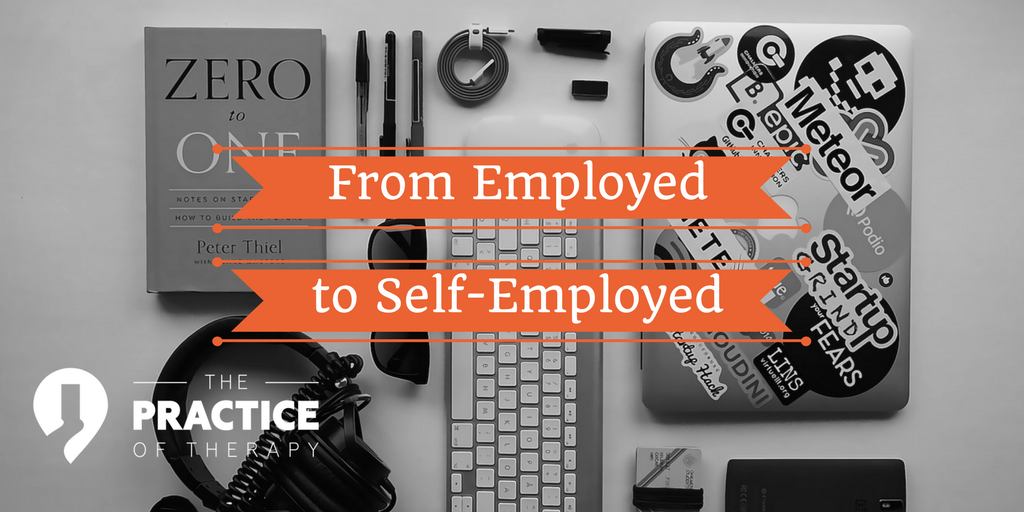 A little over 10 years ago, I made the decision to go into private practice and be self-employed as a therapist. It was a decision that was both liberating and scary. Like many people that make this journey into private practice, I was employed full-time at an agency working as a therapist. The agency work as a therapist was both rewarding and challenging. I did truly believe we were making a difference in the lives of the children and families we were serving. But I also knew the demands of the job and the long hours was not something I could do or maintain forever.
A little over 10 years ago, I made the decision to go into private practice and be self-employed as a therapist. It was a decision that was both liberating and scary. Like many people that make this journey into private practice, I was employed full-time at an agency working as a therapist. The agency work as a therapist was both rewarding and challenging. I did truly believe we were making a difference in the lives of the children and families we were serving. But I also knew the demands of the job and the long hours was not something I could do or maintain forever.
So I made the decision to at least explore private practice and see what it would take to become self-employed. It meant giving up the security of a full-time job with benefits. I also knew didn’t want to just quit and start a private practice without knowing what I was doing. That would be crazy, right?!
Self-Employment
For most, the draw for becoming self-employed is about having more freedom. It’s about being able to set your own schedule, take time off when you want to and also having the potential to earn more money. Ultimately it’s about being your own boss!
It also might be about pursuing a dream and giving yourself the freedom to work with clients in the way you want to work with them. It might be you are feeling limited clinically by agency rules and having to do therapy the way they want you to. I know I was.
With all of these freedoms to being in private practice and being self-employed, there are some trade-offs you have to take into consideration to be successful. It is important to be aware of the hidden costs for being self-employed. (Check out this blog post on that topic). In private practice you absolutely need to understand how to run and manage a small business.
How Self-Employment is Different
To understand how being self-employed is different from being employed can be somewhat confusing. The concept of employment is simply that you are hired to perform a job. In return, you receive payment for the job you perform. Self-employment is pretty much the same except that you “cut out the middleman” and get paid directly by “customers” for the services you provide.
One of the main things to understand about self-employment is to understand how the tax and legal requirements differ for those that are self-employed. Also, it is important to understand some basic accounting principles and how money flows within a business. Terms like: profit and loss, cash flows and balance sheets become very important when self-employed or running any business for that matter. (More on this in the next blog post)
Sole Proprietors & LLCs
Business classifications by the IRS are basically broken down into three broad categories: sole-proprietors, limited liability companies (LLC), and corporations. And then there are subcategories of LLCs and Corporations based on their structure and how they are taxed. All of this is where having a good accountant to give advice is so important. And for the purposes of this article, we’ll just cover some basics.
When starting a private practice a person does need to decide how they are going to set up the business side of things. And for most people, at least in the beginning stages, they will want to probably start with sole proprietorship or an LLC.
One big factor in knowing how to set up the business side of a private practice has to do with how the practice is named or “branded”. This is especially true if a practice is named something other than the name of the practitioner. For example, “Crossroads Counseling” or “Therapy Place” could be a single person running the practice. In this case, they are a “DBA” or “doing business as” entity.
It is important to understand that when a business is formed, legally, the name defaults to the name of the person or entity that owns the business. If you want the name to be something else, you will need to register as a “DBA” or an LLC or both.
Sole Proprietor
Becoming a sole proprietor is the very basic level of establishing a private practice. With this structure, your practice activities are tied to your personal finances and taxes and your tax ID number (Social Security Number). One bit of advice, and most accountants would tell you this, you will want to get a separate tax ID number (EIN) and a separate bank account for your practice. It is just good practice from an accounting and tax purposes standpoint.
LLC
The next level up from being a sole proprietor is to form an LLC. It is something that does require some investment in that you have to register with your state and form a legal entity. So there are legal and state fees you will have to pay. The advantage of doing this is that you create a layer of protection for yourself. If someone were to ever sue the practice, in theory, they could not go after your personal property and assets. And as you grow and reach certain income levels, there are some tax advantages to being an LLC.
SwyftFilings.com is a recommended resource for filing a DBA or LLC. You can form your company for just $49 + state filing fees. (Affiliate link) Some States require professionals, like counselors and therapists, to form a “PLLC” which is simply a “professional limited liability company”.
So does all this sound a little intimidating?
It does not have to be. Starting a private practice is very doable with the right knowledge and through educating yourself about running a small business. Here are some things to keep in mind and follow to get things moving in the right direction:
- Talk with an accountant or other small business expert that knows your State Laws and requirements
- Read-up on your State Laws around forming a business; Chambers of Commerce can be a great help with this. (Many have small business experts and consultants on staff. I know that my local Chamber has free courses for people starting small businesses)
- Talk to other therapists that have done this before and are running successful private practices
- Invest some time and effort to learn about accounting and finances
- Give yourself permission to be patient with process of growth. Planning is the key!
- Work on building your practice a step at a time so that you do not overwhelm yourself.
- Get the help of a mentor and/or consultant. It will absolutely be a huge return on your investment!
- Sign-up to get “Jump-Start Your Practice” which will walk you through the specific steps you need to take over a year to build and grow your practice.
Next week, I will be going into detail and explaining accounting, bookkeeping, and the financial side of being self-employed.
 By L. Gordon Brewer, Jr., MEd. LMFT – Gordon is the President and Founder of Kingsport Counseling Associates, PLLC. He is also a consultant and business mentor at The Practice of Therapy. Follow us on Twitter @therapistlearn. “Like” us on Facebook.
By L. Gordon Brewer, Jr., MEd. LMFT – Gordon is the President and Founder of Kingsport Counseling Associates, PLLC. He is also a consultant and business mentor at The Practice of Therapy. Follow us on Twitter @therapistlearn. “Like” us on Facebook.



